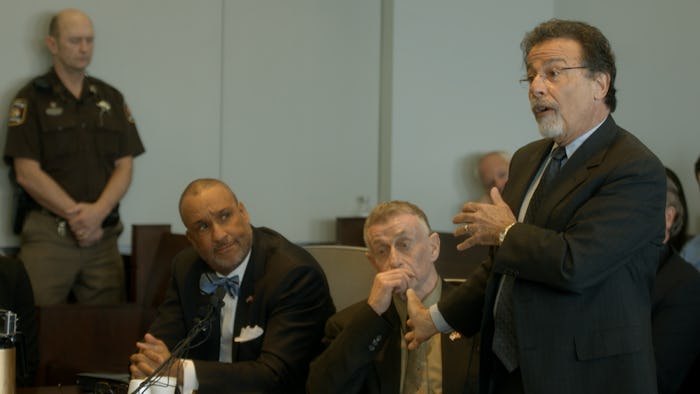Entertainment

Defense Lawyer David Rudolf Is Dedicated To Complicated Cases
Attorney David Rudolf is perhaps best known for his work on the Michael Peterson case, which was captured for the documentary series The Staircase. Viewers got to see nearly every step of the process as Rudolf planned Peterson's defense and continued to defend him in court year after year. But while his spot on Peterson's defense team made him famous, Rudolf has been a working lawyer for decades and there are several other David Rudolf cases that can be considered fairly notable.
On his professional website, Rudolf details what led him to pursue law as a career, citing "fighting for the individual against the power of the government" as the cause motivating him most. He began taking on federal criminal cases for the Federal Defender office in Brooklyn before switching to teaching in 1978. He started the Criminal Law Clinic at the University of North Carolina School of Law but realized he wanted to be back in the courtroom. "I missed the ability to give a voice to the accused, and I missed the responsibility of protecting critical Constitutional rights," Rudolf wrote.
He eventually founded his own firm in 1982 and seems to have been working with them ever since. On his site, he lists seven other cases besides Michael Peterson's that he considers significant in his career. Here they are.
Gell v. Ransome
After being convicted of the murder of Alan Ray Jenkins, Alan Gell was imprisoned for nine years, four of which were spent on death row. He insisted upon his innocence and was granted another trial after new evidence was discovered. That second trial proved he had been wrongfully convicted the first time. Then, per Rudolf's website, Gell sued the agents from the State Bureau of Investigation who allegedly fabricated and hid evidence in the first place. Gell won $3.9 million with Rudolf's help.
United States v. Nguyen
According to North Carolina Lawyers Weekly, Hai Nguyen and his wife Oanh Le had arrived in North Carolina from communist Vietnam as refugees. They worked hard while raising a family of five, slowly setting aside over $200k in savings for their children's education. Federal agents seized the money after claiming Nguyen and Le had hid it from the government. They came up on felony structuring charges but were ultimately acquitted and had their money returned.
Brown v. Isley
Floyd Brown was charged with murder in 1993, but the Charlotte Observer reported that he was deemed incompetent to stand trial because of his mental health disabilities. He was imprisoned in state mental hospitals for thirteen years because of a "confession fabricated by two agents of the North Carolina State Bureau of Investigation," according to Rudolf. Though other lawyers worked to free Brown, Rudolf and his firm settled Brown's case against North Carolina and set up a Special Needs Trust to keep the money protected. But the Charlotte Observer did specify that the restrictions of the trust made it difficult for Brown to do everything he wanted to do, like support his family and buy flowers for his mother's grave.
North Carolina v. Gay
The circumstances of Kenan Gay's second-degree murder charge were unusual: while out at a local bar in Charlotte, Gay was trying to protect his girlfriend from another drunk patron named Robert Kingston. Gay pushed Kingston out of the bar and into the street, where he was struck and killed by a car. Gay was ultimately acquitted of all charges.
Wilcoxson v. Buncombe County
Like many of the cases Rudolf deems important in his career, the murder arrest of Robert Wilcoxson involved a suspect who maintained his innocence though the police believed otherwise. Rudolf claimed that the police coerced incriminating false statements from Wilcoxson's friends. Eventually he took a plea deal so he could avoid a death sentence. Wilcoxson was later exonerated and Rudolf's firm assisted him in getting a $5.125 million settlement.
Armstrong v. City of Greensboro
LaMonte Armstrong was also wrongfully convicted of murder, spending 17 years behind bars before DNA proved his innocence. He received a settlement of $6 million.
Bridges v. City of Charlotte
After being convicted of rape, Tim Bridges spent 25 years in prison, though he too maintained his innocence. In 2017, Rudolf and his wife Sonya Pfeiffer (who also works with him) told the Charlotte Observer that they believed the Charlotte-Mecklenburg Police Department "fabricated key evidence while withholding other information from prosecutors that would have weaken the case." Bridges was freed and awarded a $9.5 million settlement from the city.
Like many of Rudolf's clients, Michael Peterson's innocence in the death of his wife Kathleen has been debated: some think she died in an accident, though others are convinced he killed her. He was convicted of the murder, though has since pled down to manslaughter. It's clear that Rudolf is dedicated to cases like this, and has spent most of his professional life focused on them.